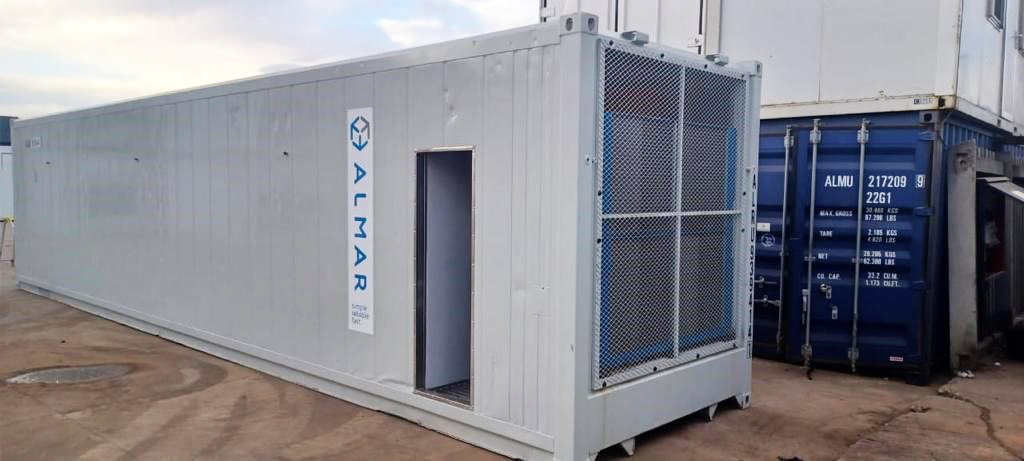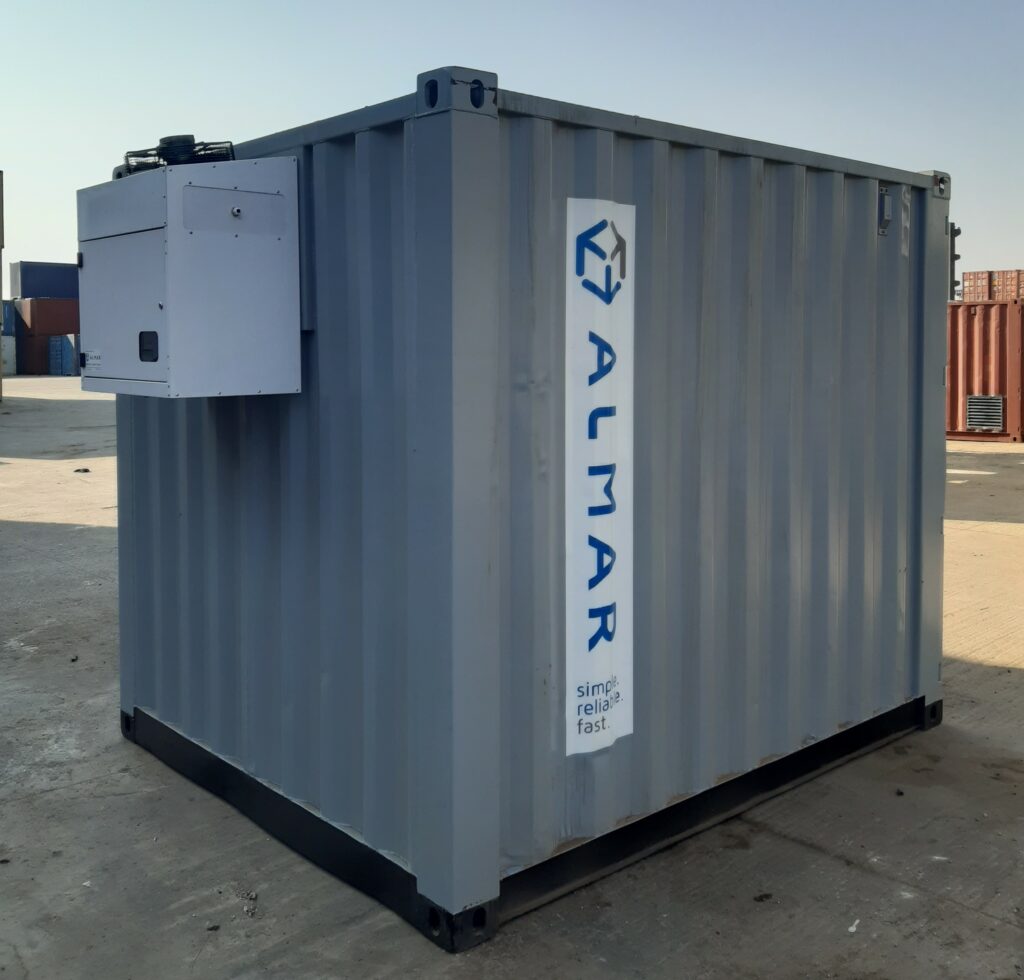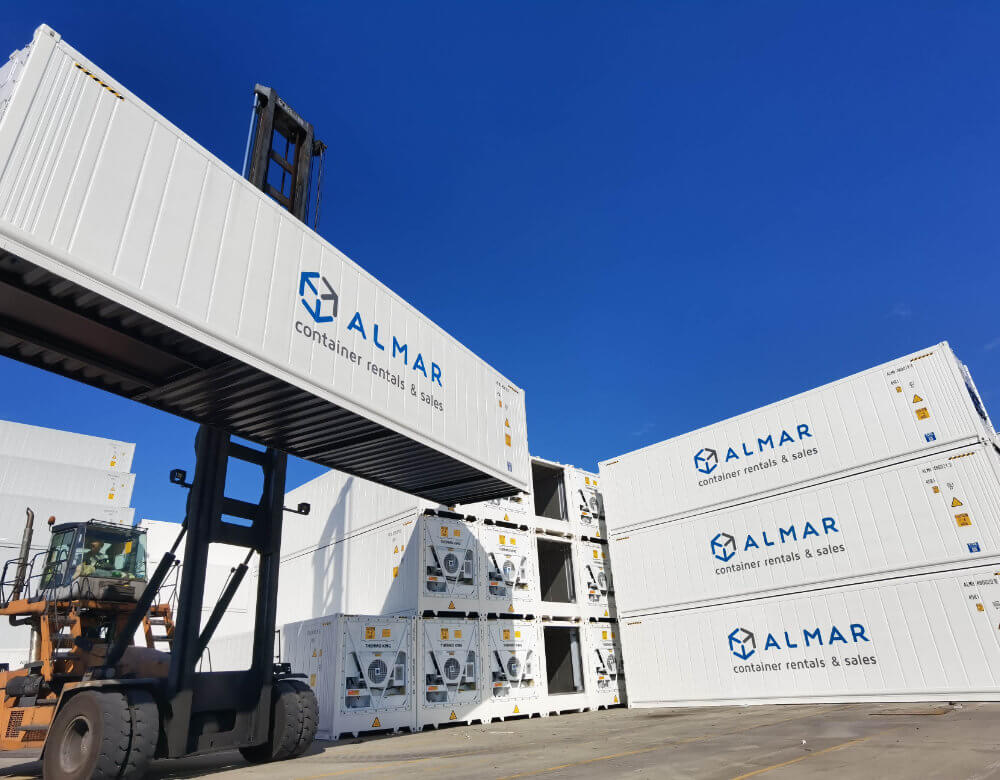Refrigerated containers are mobile cold / freezer rooms and can be a temporary or permanent cold storage solution. Refrigerated containers for rent are ideal for the cold storage of fresh and frozen fruit, vegetables, fish, meat and poultry, beverages, ice cream, cut flowers, artefacts (paintings, books), medicines, etc.
The temperature range is between +20 °C to -35 °C and temperatures can be controlled up to a tenth of a degree, ensuring that your product is kept at the perfect temperature.
All Almar refrigerated container rentals (reefers, chillers, and blast freezers) are available nationwide. Almar partners with depots in all the major cities - Johannesburg, Durban, Port Elizabeth, and Cape Town and can organise the transportation of your reefer, chiller, and blast freezer wherever there is a flat and stable surface, accessible by the truck and, if necessary, a crane.



Refrigerated container rental prices are the same across South Africa. The only difference in price is the transportation, which Almar outsources. Customers are welcome to arrange transportation themselves.
The best site would be on a flat, level surface close to an electrical supply. Almar Container Rentals and Sales suggest that the customer supplies blocks to level the container in the event that the area is not level. These blocks should be made from suitable materials capable of supporting 10 to 20 tons. The ideal material would be old railway sleepers or concrete blocks. Bricks and softwood are not suitable for this job.
Rigging is required when a container is placed in a warehouse with low access points. The container is placed onto rollers and rolled into position. Sometimes wooden rollers or steel crawlers are used, depending on the surface.
Rigging is moving, securing, or putting down a load (in this case a refrigerated container) using the appropriate mechanical shifting equipment. To move a load, riggers use equipment like cranes and hoists or other machinery like chain blocks and winch systems.
Where rigging is required, either a site visitation is required, or very clear photos and details from the customer to avoid any surprises, delays, and additional costs.
External transportation companies will assist in moving an empty refrigerated container from the depot to the site where the customer requires placement. Please note that it is very unlikely that they will transport a refrigerated container full of stock.
Should the customer require Almar Container Rentals and Sales to arrange to move the container from one site to another, we will request that the reefer, chiller, or blast freezer be emptied and restocked at the container’s new destination. When a container is fully loaded with stock it is extremely heavy and, because it is not a common request, the transport company is unlikely to have the equipment to lift a full Refrigerated Container. An empty 12m reefer will weigh around 3 tons while a full one anything up to 30 tons.
Please note that the insurance for the content of the container always falls on the customer.
Whether you are loading fresh grapes harvested for wine, cut flowers, citrus fruit, meat, fish, or medicine, the loading level is indicated by the red load level inside the container.
Please note the following when packing your refrigerated container:
Each type of unit (reefer, chiller, blast freezer) has a different refrigeration capacity. The heat load, product temperatures, and daily access, also affect electrical consumption.
A refrigerated container set at the desired temperature, left with doors closed will draw a steady 10A, and at 380 to 400V this equates to around 4kW/hr. If the same reefer is continually loaded with warm product and accessed multiple times per day, the Refrigerated Container is having to work that much harder and could draw almost double the current i.e., almost an 8kW/hr consumption. In monetary terms, this means it will double your electrical bill.
The reefer, chiller, or blast freezer needs to be unplugged, empty, with no ice, cleaned, and accessible for collection.
The refrigerated container is removed from any permanent electrical installation, all product has been removed from the interior of the container and the floor of the container is cleaned out of all refuse and product spillage. No pallets or other cargo must be stored on top or around the reefer that could delay the transporters from arriving, picking up the reefer, and leaving. Understandably delays cost money.
Once all product is removed, set the Refrigerated Container to +25C, and leave overnight. Make sure all ice is cleared fully from the floor area and that the drainpipe is clean and free-flowing. DO NOT be tempted to use screwdrivers, hammers, and other tools to remove ice.
If clearing the container overnight is not possible, the ice needs to be removed with running water while the product is left within the container.
Please call our technical department to discuss the best solution to this problem.
For more information contact us at +27 86 001 7476 or email sales.za@almar.co.za